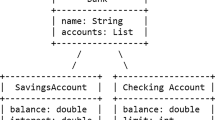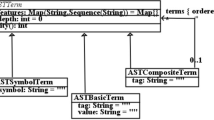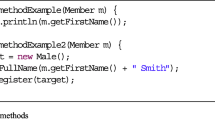Abstract
As practical tools for disciplined multi-level modeling have begun to mature, the problem of supporting simple and efficient transformations to-and-from multi-level models to facilitate interoperability has assumed growing importance. The challenge is not only to support efficient transformations between multi-level models, but also between multi-level and two-level model content represented in traditional modeling infrastructures such as the UML and programming languages. Multi-level model content can already be accessed by traditional transformation languages such as ATL and QVT, but in a way that is blind to the ontological classification information they contain. In this paper, we present an approach for making rule-based transformation languages “multi-level aware” so that the semantics of ontological classification as well as linguistic classification can be exploited when writing transformations.



















Similar content being viewed by others
Notes
In this paper we use the term “ontology” to refer the collection of all the (domain) model elements across all the ontological levels within the \(L_1\) linguistic level.
References
Asikainen, T., Männistö, T.: Nivel: a metamodelling language with a formal semantics. Softw. Syst. Model. 8(4), 521–549 (2009)
Atkinson, C., Kühne, T.: Rearchitecting the UML infrastructure. ACM Trans. Model. Comput. Simul. 12(4), 290–321 (2002)
Atkinson, C., Kühne, T.: Reducing accidental complexity in domain models. Softw. Syst. Model. 7(3), 345–359 (2008)
Atkinson, C., Muthig, D.: Component-based product-line engineering with the UML. In: Software Reuse: Methods, Techniques, and Tools. Lecture Notes in Computer Science. Springer (2002)
Atkinson, C., Stoll, D.: Orthographic modeling environment. In: Fundamental Approaches to Software Engineering. Lecture Notes in Computer Science. Springer (2008)
Atkinson, C., Gutheil, M., Kennel, B.: A flexible infrastructure for multilevel language engineering. IEEE Trans. Softw. Eng. 35(6), 742–755 (2009)
Atkinson, C., Gerbig, R., Tunjic, C.: Towards multi-level aware model transformations. In: Hu, Z., de Lara, J. (eds.) Theory and Practice of Model Transformations, Lecture Notes in Computer Science, vol. 7307, pp. 208–223. Springer, Berlin (2012)
de Lara, J., Guerra, E.: Deep meta-modelling with metadepth. In: Proceedings of the 48th International Conference on Objects, Models, Components, Patterns. pp. 1–20. TOOLS’10, Springer, Berlin (2010)
Demuth, A., Lopez-Herrejon, R.E., Egyed, A.: Cross-layer modeler: a tool for flexible multilevel modeling with consistency checking. In: Proceedings of the 19th ACM SIGSOFT Symposium and the 13th European Conference on Foundations of Software Engineering. pp. 452–455. ESEC/FSE ’11, ACM, New York (2011)
Eclipse Foundation: ATL Developer Guide—Regular VM. http://wiki.eclipse.org/ATL/Developer_Guide#Regular_VM
Eclipse Foundation: ATL/User guide—the ATL language. http://wiki.eclipse.org/ATL/User_Guide_-_The_ATL_Language
Gonzalez-Perez, C., Henderson-Sellers, B.: A powertype-based metamodelling framework. Softw. Syst. Model. 5, 72–90 (2006)
Gronback, R.C.: Eclipse Modeling Project: A Domain-Specific Language (DSL) Toolkit, 1st edn. Addison-Wesley Professional (2009)
Jouault, F., Allilaire, F., Bézivin, J., Kurtev, I.: Atl: a model transformation tool. Sci. Comput. Program. 72(1–2), 31–39 (2008)
Jouault, F., Tisi, M.: Towards incremental execution of atl transformations. In: Tratt, L., Gogolla, M. (eds.) Theory and Practice of Model Transformations, Lecture Notes in Computer Science, vol. 6142, pp. 123–137. Springer, Berlin (2010)
Kolovos, D.S., Paige, R.F., Polack, F.A.C.: Eclipse development tools for epsilon. In: In Eclipse Summit Europe, Eclipse Modeling Symposium (2006)
Kolovos, D.S., Paige, R.F., Polack, F.A.C.: The epsilon object language (eol). In: Proceedings of the Second European Conference on Model Driven Architecture: Foundations and Applications. pp. 128–142. ECMDA-FA’06, Springer, Berlin (2006)
Kolovos, D., Paige, R., Polack, F.: The epsilon transformation language. In: Vallecillo, A., Gray, J., Pierantonio, A. (eds.) Theory and Practice of Model Transformations, Lecture Notes in Computer Science, vol. 5063, pp. 46–60. Springer, Berlin (2008)
Kurtev, Bézivin, J., Aksit, M.: Technological spaces: an initial appraisal. In: CoopIS, DOA’2002 Federated Conferences, Industrial Track. Irvine (2002)
de Lara, J., Guerra, E.: Domain-specific textual meta-modelling languages for model driven engineering. In: Vallecillo, A., Tolvanen, J.P., Kindler, E., Strrle, H., Kolovos, D. (eds.) Modelling Foundations and Applications, Lecture Notes in Computer Science, vol. 7349, pp. 259–274. Springer, Berlin (2012)
OMG—Object Management Group: Meta object facility (mof) 2.0 query/view/transformation specification. http://www.omg.org/spec/QVT/1.0/PDF/, http://www.omg.org/spec/QVT/1.1/ (2011)
Sendall, S., Kozaczynski, W.: Model transformation: the heart and soul of model-driven software development. IEEE Softw. 20(5), 42–45 (2003)
Simons, P., Niemelá, I., Soininen, T.: Extending and implementing the stable model semantics. Artif. Intell. 138(1–2), 181–234 (2002)
Steinberg, D., Budinsky, F., Paternostro, M., Merks, E.: EMF: Eclipse Modeling Framework, 2nd edn. Addison-Wesley Professional (2009)
University of Mannheim—Software Engineering Group: MelanEE—Multi-Level Modeling And Ontology Engineering Environment. http://www.melanee.org
University of Mannheim—Software Engineering Group: nAOMi—opeN, Adaptable, Orthographic Modeling Environment. http://eclipselabs.org/p/naomi
Volz, B., Jablonski, S.: Towards an open meta modeling environment. In: Proceedings of the 10th Workshop on Domain-Specific Modeling. pp. 17:1–17:6. DSM ’10, ACM, New York (2010)
Volz, B., Zeising, S., Jablonski, S.: The open meta modeling environment. In: ICSE 2011 Workshop on Flexible Modeling Tools (FlexiTools 2011) (2011)
Author information
Authors and Affiliations
Corresponding author
Additional information
Communicated by Prof. Juan de Lara and Prof. Zhenjiang Hu.
Rights and permissions
About this article
Cite this article
Atkinson, C., Gerbig, R. & Tunjic, C.V. Enhancing classic transformation languages to support multi-level modeling. Softw Syst Model 14, 645–666 (2015). https://doi.org/10.1007/s10270-013-0384-y
Received:
Revised:
Accepted:
Published:
Issue Date:
DOI: https://doi.org/10.1007/s10270-013-0384-y




